|
|
|
CONTACT US
Click Here! |
| This site is best viewed with a screen resolution of 800 X 600 at high colour settings |
|
Flask List
Acacallis-Ancistrochilus Angraecum-Aspasia Barkeria-Broughtonia Bulbophyllum Capanemia-Catasetum Cattleya Cattleyopsis-Cycnoch, Cymbidium-Cyrtorchis Dendrobium-Dossinia Encyclia-Eulophiella Galeandra-Jumellea Laelia-Lycaste Macodes-Nephalaphyll, Odontogloss,-Oncidium Paphiopedilum-Psychilis Rangaeris-Stenocoryne Tainia-Zygopetalum |
|
Plant List
Acampe-Bulbophyllum Cattleya-Dossinia Encyclia-Promeaea Renanthera-Vanda |

Multiply and conserve orchid speciesOccasionally one encounters the unexpected in the orchid world. I quote below an email received. Dear Jan & Pat, Yesterday, June 3 arrived your very impressing orchid-flask list, sent March 3, 2001. You can not imagine how happy you made me. Finally there is sombody in this blasted world who is really interested in conservation of orchids species!
As you might know from the literature the Dunsterville´s, the late -Stalky and Nora -still alive-96- were my tutors. I will never forget--few weeks before he died--he said, "Gernot do not forget your promise, N E V E R press an orchid flower and fight to the end with the 'professional' Botanists".
Stalky was an oil engineer and I am a virologist. I kept my promise and wrote some years ago a short article about this. It was refused by the AOS and the Orchid Review. So I translated it into German and it appeared in "Die Orchidee". Since then several of my previous friends like Romero, Gerlach etc. hate me and refuse to cooperate and help.
But I will go to the Australien Ambassy with a bunch of orchids, may be they can help.
Unfortunatly nobody has the Australian Orchid Review could you send the foto by e-mail. If the seeds of your Coryanthes gernotii came from Carlos Garcia it certainly will be gernotii, but they vary much. I have just published a short note with 12 fotos about it in our "ORQUIDEOPHILO" and will send it to you.
By the way have you read the controversial article about conservation mentioned above in "Die Orchidee"?
With profound estimation and congratulations for your effort to multipy and conserve orchid species and best greetings to both of you Gernot Bergold. Dr.Gernot Bergold, CARACAS, Venezuela. Coryanthes gernotii is named after Dr Gernot Bergold. We received seed of this species from another Venezuelean grower Carlos Garcia, a few years back.
It is essential to hang the plants, to keep them out of reach of slugs and snails.
In the wild, they inhabit aboreal ant nests, not for the ants or their formic acid as has been suggested, but for the protection the aggressive ants offer against things that like to eat Coryanthes. Chewing pests love the Coryanthes and slugs and snails will quickly kill a plant. |
Text by Ian Walters and Gernot Bergold.
Photographs by Ian Walters and Gernot Bergold.
May be reproduced provided source acknowledged.
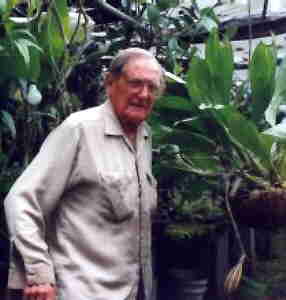 In june I will be 89 years and had practically given up to find somebody to cooperate with. Unfortunately it´s 30 years too late.
In june I will be 89 years and had practically given up to find somebody to cooperate with. Unfortunately it´s 30 years too late.
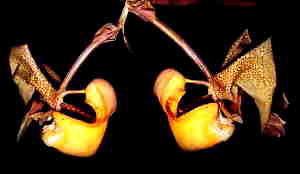 In the past 35 years I made over 800 crossings, mostly species and send protocorms and seedlings free all over the world, even to Kiev. However lately,my wife died 5 jears ago with Leucemia, I have some trouble with my heart and a leaking mitral valve. They tried to implant a pace-maker -.on 6 points- but could not because I have a Fibrosis. So I am quite depressed and have neglegted my orchids. Many have died but there are still about 6000 or more left´, but I don´t make any more crossings.
In the past 35 years I made over 800 crossings, mostly species and send protocorms and seedlings free all over the world, even to Kiev. However lately,my wife died 5 jears ago with Leucemia, I have some trouble with my heart and a leaking mitral valve. They tried to implant a pace-maker -.on 6 points- but could not because I have a Fibrosis. So I am quite depressed and have neglegted my orchids. Many have died but there are still about 6000 or more left´, but I don´t make any more crossings.
 Back to earth, checking your list, right now there are several seed pods ready of Phragmipedium lindeni which I will send you by airmail, later Anguloas hohenlohi, the new white one which Oakeley described recently although I have send him fotos and sprits 12 years ago.
Back to earth, checking your list, right now there are several seed pods ready of Phragmipedium lindeni which I will send you by airmail, later Anguloas hohenlohi, the new white one which Oakeley described recently although I have send him fotos and sprits 12 years ago.
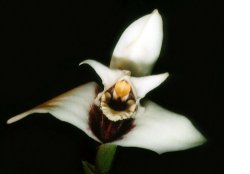 A Coryanthes has 2 flowerbuds which might be a new variety of gernotii. I hope a recently found Coryanthes might be pegiae. Right now a Lycaste fulvescens has 20 flowers as well as a Lycaste grande. Shall I fertilize them for you and others which are not on your list and will flower f.i. Maxillaria sanderiana, Lueddemannia pescatoriae etc. Furthermore I still have around 50 flasks with small seedlings, but there is the problem with shipping.
A Coryanthes has 2 flowerbuds which might be a new variety of gernotii. I hope a recently found Coryanthes might be pegiae. Right now a Lycaste fulvescens has 20 flowers as well as a Lycaste grande. Shall I fertilize them for you and others which are not on your list and will flower f.i. Maxillaria sanderiana, Lueddemannia pescatoriae etc. Furthermore I still have around 50 flasks with small seedlings, but there is the problem with shipping.
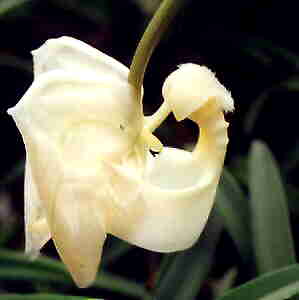 Now about the Coryanthes alba and Polyrhiza lindenii. Please prepare them.
Now about the Coryanthes alba and Polyrhiza lindenii. Please prepare them.
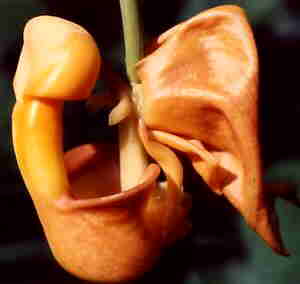 Coryanthes are shade growers and should be cultivated in small pots or baskets in a media that does not dry out. Commonly, spaghnam moss is used, and the plants grow very quickly if kept warm and in high humidity.
Coryanthes are shade growers and should be cultivated in small pots or baskets in a media that does not dry out. Commonly, spaghnam moss is used, and the plants grow very quickly if kept warm and in high humidity.